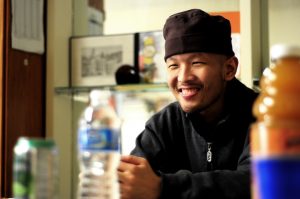On April 16, Class of 2007 alumnus Jack Chin posted news that many of his followers on the Facebook page “Save Jack from Leukemia” were hoping for: “Thank you all for the help and support you have been giving me. In a week, I will be undergoing one of the most dangerous and arduous procedures known to modern medicine … the bone marrow transplant.”

Chin was diagnosed with Acute Lymphoblastic Leukemia during early January 2012 and was informed he needed to find a bone marrow match to survive. Since then, the Chin family has been searching throughout the Bay Area for a match. Drives were held in the Cupertino area by the AADP as well as at MVHS on Feb. 10. Staff and students raised awareness about his search through a series of photos taken by art and photography teacher Brian Chow. These photos were posted around campus and other areas around Cupertino.
Chin was informed in mid-April by the Stanford Hospital that a 9/10 Human Leukocyte Antigen gene match was found; Chin’s rare genetic marker made it difficult for him to find a perfect match. According to his post on the Facebook page, Chin underwent over a week of body radiation followed by high doses of chemotherapy for two days in order to clear his immune system of the white blood cells that failed to perform their function of fighting his infections.
According to his brother, Class of 2006 alumnus Jim Chin, Jack received the transplant on April 24. The Chin family is unaware of the identity of the donor, as donors are by law required to be anonymous. The process of the marrow transplant, according to Jim, lasted less than an hour. However, it is the side effects of the transplant that make it a “dangerous and arduous procedure”. Jack’s doctors estimate that his recovery period will last a year until his immune system stops attacking the donor’s foreign white blood cells, a stage called “engraftment”.
“The thing with finding a donor is once the transplant is done, it’s a really long and dangerous recovery period,” Jim said. “But it’s better than not finding a match … [We’re] glad we found one.”
The following two to four weeks after the transplant are the most critical, as Jack is highly susceptible to viruses and bacteria. The number and frequency of his visitors, as well as his diet, will be highly restricted to prevent exposing him to potential sources of infection.
Depending on the speed of Jack’s recovery, he plans to complete his final year at UCLA and find a job to compensate for the months he has spent at home or in the hospital for chemotherapy. However, despite this arduous task, Jack stays positive. Part of his latest message to the community following him on his Facebook page reads: “I look forward to partying hard, and thanking each and [every] one of you that have given your support and concern. In the words of Keanu Reeves, ‘Pain heals, chicks dig scars, and glory lasts forever’. Thumbs up, let’s do this!”
To learn more about Jack’s story, read “You don’t know Jack”, in the March issue of the El Estoque magazine. To follow his transplant updates and recovery, visit his Facebook page.
This article was updated on May 3 at 8:35 p.m.










